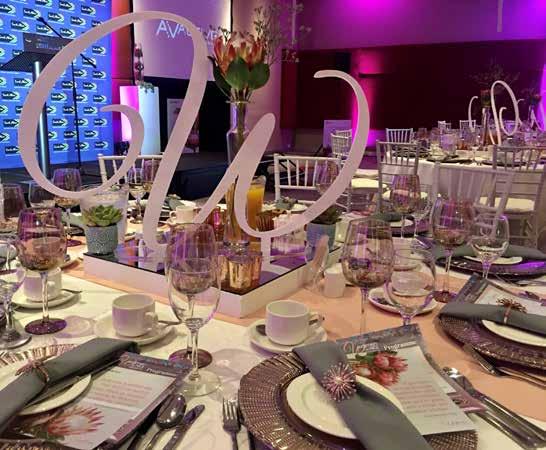
5 minute read
Planning priority
The rules of planning are changing, not because we need to do this differently but because we need to account for the increasing number of elements involved, resulting in more steps and processes to check off on our to-do lists. Meetings delves deeper.
As any planner who has been around for two decades or more can tell you, planning a conference in 2020 is not what it was in 1990s, or even before this. The biggest game changers have, of course, been technology and social media, which have not just shifted the way we organise but the way in which delegates engage with events. From Kanban planners to entire apps dedicated to a single event, organisers can structure, book and mobilise each step of their event from any device connected to the internet, all in the palm of their hand.
Advertisement
REGISTRATION Forget barely legible scanned or faxed forms; everything is now captured digitally, making it easier than ever to account for each of our delegates and plan for more accurate numbers. A seamless registration process that is digitally automated also ensures that the first experience that your attendees have is one that is easy and fuss-free. This sets a positive tone for the rest of your event, but test your system thoroughly so that you can understand the end-user journey and iron out any bugs before launching it. SOCIAL MEDIA With social media, events can now be more than a once-off, neverto-be-repeated experience. Providing communication platforms for everybody, Facebook, Twitter and Instagram are becoming part of every event’s marketing campaign because the exposure generated has taken the engagement of our target audiences with our events to the next level.
For many, this is uncharted territory. Twenty years ago, the term ‘social media’ was barely a blip on our radars; however, if utilised successfully, this can do wonders for your event, forming a key touchpoint between you and your delegates. for the duration of their event, so that they can go to sessions that are of interest to them while organising time for meetings around these. These are set up in such a way that delegates can accept or decline requests and they can also then notify the delegate of upcoming meetings.
MARKETING
Events as a form of marketing and communication to our audiences are becoming increasingly popular
because of how they are able to deliver an omnichannel experience. While physical attendees are important for the success of an event, events can also be livestreamed and outtakes packaged in small, bite-sized videos that can then be broadcast. Once available online, video can then be linked to any social media platform, meaning your event can be distributed across the globe in an instant. Twenty years ago, the term ‘social media’ was barely a blip on our radars; however, if utilised successfully, this can do wonders for your event, forming a key touchpoint between you and your delegates

MEETING ORGANISERS Delegates can now have a far more focused and strategic approach to their networking, with event apps that allow for speednetworking or organised meetings with the most relevant players attending an event. Apps can be designed with functionality that allows for attendees to arrange their diaries
PLAN AN IMPACTFUL SOCIAL MEDIA CAMPAIGN IN 10 STEPS HOW TO… #ONLINEINFLUENCER
# 1
CREATE A HASHTAG AND PROMOTE IT ACROSS ALL AVAILABLE PLATFORMS A unique hashtag just for your event can create a social media buzz, increase engagement and even boost delegate attendance.
# 4
LAUNCH A DEDICATED LANDING PAGE An event landing page needs to act as a onestop shop for your visitors to learn more about your event and, ultimately, all your social media promotion needs to drive traffic back to your landing page.
# 7
DRIVE COMPETITIONS Think of fun ways to engage with your audience and spread the word about your event by running social media contests with your event hashtag by asking a question that’s related to your event.
# 10
GO LIVE Live video has proven to be more engaging and it is estimated that this can convert 30% of your viewers into event attendees for the following year.
# 2
THE EARLIER YOU START, THE BETTER The earlier you start promoting your event and making use of its hashtag, the higher your chances are of success. To ensure better reach and traction, experts recommend you start promoting your event at least six to eight weeks in advance.
# 3
CREATE A FACEBOOK EVENT PAGE With over 2.5 billion active users, Facebook is the world’s largest social media network. Facebook can help spread the word about your event so that each time someone RSVPs, Facebook promotes this further by showing it on their friends’ feeds.
# 5
YOUR SPEAKERS CAN BE AMBASSADORS FOR YOUR EVENT Your guest speakers will have a network of their own, some undoubtedly being influencers within their industry. Request that they tweet or share their event experience on their own platforms and encourage this by mentioning them in a post that can easily be shared or retweeted by them.
# 8

LEVERAGE THE RIGHT SOCIAL MEDIA PLATFORMS Some social media platforms will perform better than others, so choose the right ones to promote your event. B2B conferences would likely see better results on Twitter and LinkedIn, whereas concerts and festivals will do better on Facebook, Instagram and Snapchat.
# 6
THINK ABOUT HOW YOU CAN PACKAGE CONTENT Line up all your assets to get more mileage out of your event promotion. Pay attention to photos and videos especially because this sort of media is most popular with audiences.
# 9

DISPLAY SOCIAL MEDIA A live social media feed to display social media posts can encourage further engagement at your event while at the same time promoting your event hashtag to make it trend.










